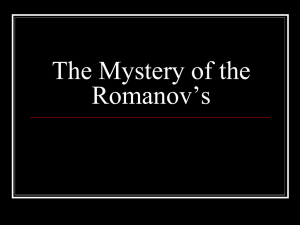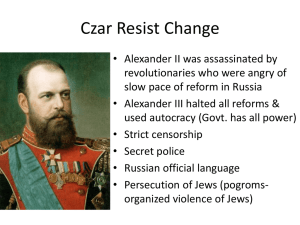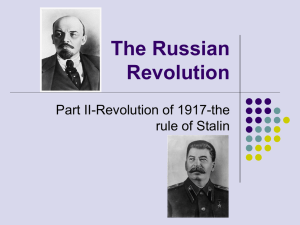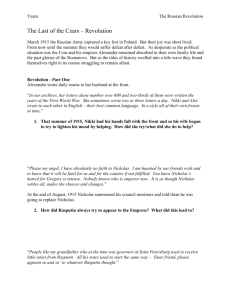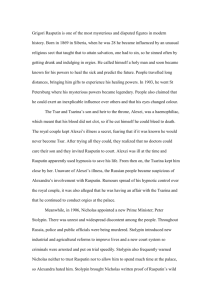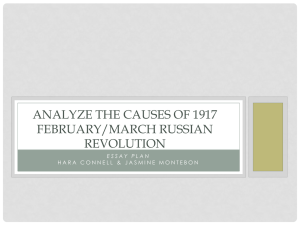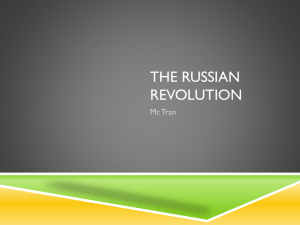The Personal life of Nicholas II pasha
advertisement
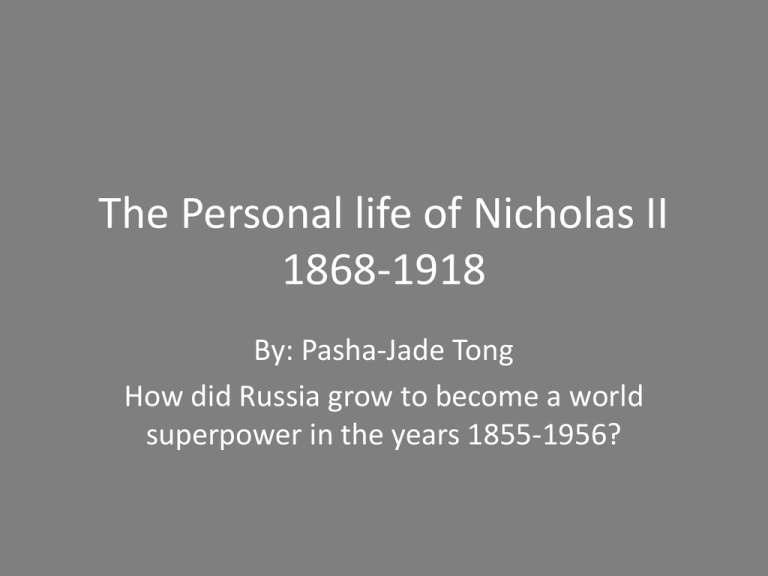
The Personal life of Nicholas II 1868-1918 By: Pasha-Jade Tong How did Russia grow to become a world superpower in the years 1855-1956? life • He was christened His Imperial Highness Nikolai Aleksandrovitch Romanov, Grand Duke of Russia. • He was the last Emperor of Russia and succeeded his father Alexander III and was Grandson to the wonderful Alexander II ‘Tsar Liberator’ As Tsar • Nicholas II was a highly sensitive man who preferred to be with his family than involve himself in the day-today running of his nation. A weak man, he was frequently bullied into doing things by his overbearing wife, Alexandra. • people in Russia hoped for a new start under Nicholas. However, the reign got off to a bad start from the first day. At the coronation ceremony in 1894, the crowd gathered for the traditional distribution of gifts. The crowd was understandably large and the police had to force a way through for Nicholas. This caused a stampede and 1,300 people were crushed to death and many more were injured. Despite this tragedy, Nicholas and Alexandra acted as if nothing had happened and attended the coronation ball that evening just hours after the deaths. This event showed that Nicholas, the sensitive family man, had less sensitivity for those not in his gilded circle. Family life • He married Alexandra (nicknamed Alexi) of Hesse, and had having had an affair with the ballerina Mathilde Kschessinka in his Tsaravich days. Alexandra was never popular in Russia. Her personality upset and angered very many of the people she met. However, despite her attempts to get her husband to be more resolute, she was a devoted wife to Nicholas The RussoJapanese war • Nicholas attempted to expand his territories into Manchuria and provoked war with Japan in 1904, it was a catastrophe and Russia lost Million of people. In fact 2/3rds of the fairly recently built up fleet. Defeat in the war with Japan of 1904-5 seriously damaged Russian prestige - and with it the esteem of the monarchy. • At the same time as Russia faced war with Japan, there was increasing industrial unrest at home. Workers who faced long hours and poor conditions increasingly formed protests. • Consequently and understandably there was unrest in Russia. There were riots and strikes, and in January 1905 ‘Bloody Sunday’ had the army open fire on men women and children as the peacefully marched to present a petition against the war and requesting certain liberties to Nicholas. Approximately 90 died and there was much anti tsar feelings in Russia. The Trans-Siberian railroad • He directed the trans-siberian railroad and made peace with France Alexandra of Hesse • • Alexandra was instrumental in convincing Nicholas to resist evergrowing calls for increased democracy within Russia. Alexandra was a firm believer in the autocratic principle. Nicholas required little persuasion: as a nationalist he decried those who favoured western style democracy. Alexandra was unpopular with the Russian elite, more so as evidence emerged of her increasing influence over her husband. Her reliance upon Grigory Rasputin in determining Russian policy angered many, ultimately leading to Rasputin's assassination. Grigori Rasputin • When doctors could not help Alexei, the Tsarina looked everywhere for help, and asked for the help of the charismatic peasant healer Rasputin • He was said to possess the ability to heal through prayer and in spite of the doctors' prediction that he would die. Every time the boy had an injury which caused him internal or external bleeding, the Tsarina called on Rasputin, and the Tsarevich subsequently got better. This made it appear that Rasputin was effectively healing him. Rasputin and Alexandra • • • While Tsar Nicholas II was away at the front, Rasputin's influence over Tsarina Alexandra increased. Nicholas II had a romantic vision of him leading his army. Therefore, he spent much time at the Eastern Front. This was a disastrous move as it left Alexandra in control back in the cities. Rasputin soon became her confidant and personal adviser, and some say also convinced her to fill some governmental offices with his own handpicked candidates. To further the advance of his power, Rasputin cohabited with upper-class women in exchange for granting political favours. Because of World War I and the ossifying effects of feudalism and a meddling government bureaucracy, Russia's economy was declining at a very rapid rate. Many at the time laid the blame with Alexandra and with Rasputin, because of his influence over her. She had become increasingly under the influence of the one man who seemingly had the power to help her son, Alexis, afflicted by haemophilia. Alexandra believed that Rasputin was a man of God and referred to him as “Our Friend”. Others, appalled at his influence over the tsarina, called him the “Mad Monk” – though not in public unless they wanted to incur the wrath of Alexandra. The End Anastasia
